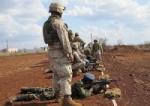The top general of the Marine Corps is pushing hard to deploy marines to Afghanistan as he looks to draw down his forces in Iraq, but his proposal, which is under discussion at the Pentagon this week, faces deep resistance from other military leaders.
Commandant Gen. James Conway's plan, if approved, would deploy a large contingent of Marines to Afghanistan, perhaps as early as next year. The reinforcements would be used to fight the Taliban, which US officials concede is now defending its territory more effectively against allied and Afghan forces.
Within the Pentagon, General Conway's proposal has led to speculation about which, if any, American forces would be best suited to provide reinforcements for a mission that, most agree, has far more political appeal than the one in Iraq. Adm. Mike Mullen, chairman of the Joint Chiefs of Staff, has already recommended against the proposal, at least for now, a military official said Tuesday…
Conway says that Marines, who have been largely responsible for calming Anbar Province in Iraq, can either return home or "stay plugged into the fight" by essentially redeploying to Afghanistan...














Bookmarks